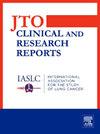恩替瑞尼诱发的心肌炎和急性心力衰竭对类固醇治疗有反应:病例报告
IF 3
Q2 ONCOLOGY
引用次数: 0
摘要
一名 72 岁的男性因呼吸困难加重而到全科医师处就诊,在初次诊断和早期疾病根治治疗 8 年后,被诊断为复发性 ROS1 阳性 IIIB 期 NSCLC。随后,他开始服用恩替替尼,但在慢性肾病的背景下,因反复急性肾损伤而需要住院治疗。在接受调查期间,他的恩替利尼在首次服药后第 20 天被暂停。尽管如此,他的呼吸困难和双侧足底水肿仍在不断恶化,后来在首次服用恩替瑞尼 31 天后出现急性肺水肿,尽管过去 11 天一直在暂停用药。生化检查和心脏成像结果证实了急性心肌炎。起初,他接受了标准心衰药物治疗,但临床症状没有改善,N末端前B型钠尿肽水平也没有下降。然而,在开始短期服用泼尼松龙后,他的病情有了明显好转,症状完全缓解,N末端前B型钠尿肽水平有所改善,左室射血分数也有所恢复。随后,他接受了克唑替尼治疗,耐受性良好。这是报告的第三例恩替替尼诱发的心肌炎病例,也是报告的第一例通过类固醇治疗成功治愈的病例。该病例在接受恩替瑞尼治疗后还并发了急性心力衰竭,但对泼尼松龙(40 毫克)的治疗反应迅速。恩替瑞尼诱发的心脏毒性是一个需要注意的重要不良事件,尤其是患者在病情明显恶化前的最初一段时间可能没有症状。本文章由计算机程序翻译,如有差异,请以英文原文为准。
Entrectinib-Induced Myocarditis and Acute Heart Failure Responding to Steroid Treatment: A Case Report
A 72-year-old man presented to his general practitioner with worsening dyspnea and was diagnosed with having recurrent ROS1-positive stage IIIB NSCLC 8 years after initial diagnosis and radical treatment for early stage disease. He was subsequently started on entrectinib but required hospital admissions for recurrent acute kidney injuries on a background of chronic kidney disease. His entrectinib was withheld on day 20 since his first dose of treatment while he was being investigated. Nevertheless, he continued to experience worsening dyspnea and bilateral pedal edema and later developed acute pulmonary edema 31 days after his first dose of entrectinib, despite the drug being withheld for the past 11 days. Results of biochemical tests and cardiac imaging confirmed acute myocarditis. Initially, he was treated with standard heart failure medications without clinical improvement or decline in N-terminal pro B-type natriuretic peptide levels. Nevertheless, he noticed significant improvement after starting a short course of prednisolone, which led to complete resolution of symptoms, improved N-terminal pro B-type natriuretic peptide levels, and recovery of left ventricular ejection fraction. His treatment was subsequently changed to crizotinib, which was well tolerated. This is the third reported case of entrectinib-induced myocarditis and the first reported case which has been successfully managed with steroid therapy. This case was also associated with concurrent acute heart failure after entrectinib treatment which responded promptly to prednisolone (40 mg). Entrectinib-induced cardiotoxicity is an important adverse event to be aware of, particularly as patients may be asymptomatic for an initial period before significant deterioration.
求助全文
通过发布文献求助,成功后即可免费获取论文全文。
去求助
来源期刊

JTO Clinical and Research Reports
Medicine-Oncology
CiteScore
4.20
自引率
0.00%
发文量
145
审稿时长
19 weeks
 求助内容:
求助内容: 应助结果提醒方式:
应助结果提醒方式:


